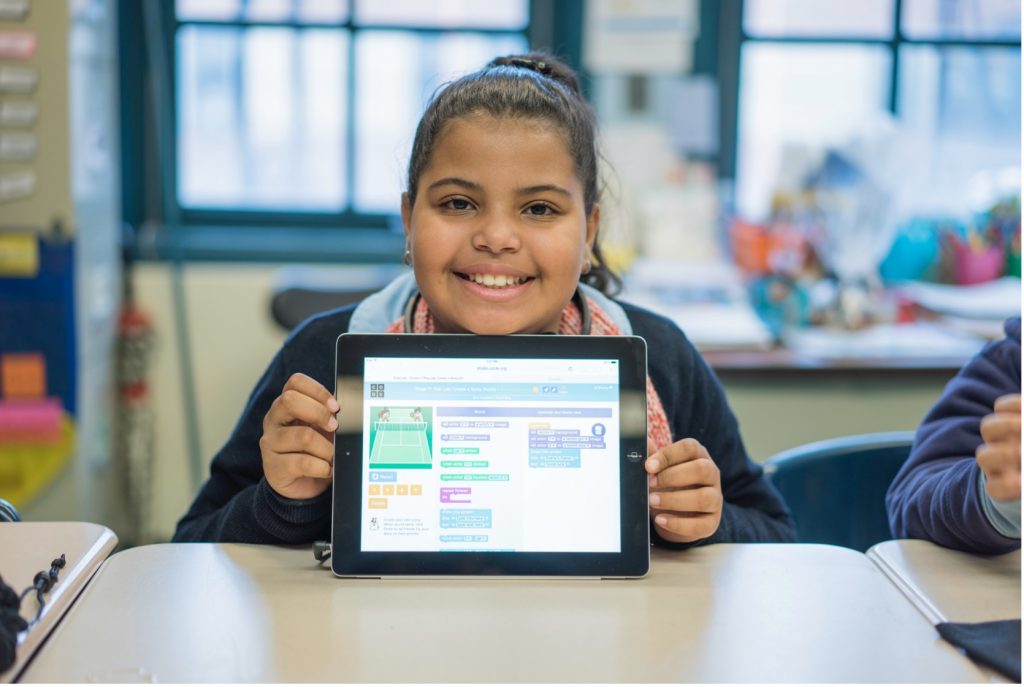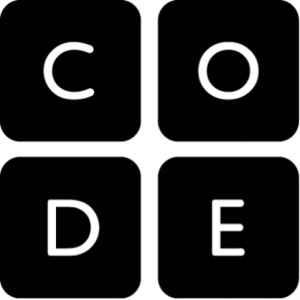Computer Science Fundamentals
Impact
Around the world:
- 18,809,549 students have started a CS Fundamentals course
- 156,891 teachers have started teaching a CS Fundamentals course.
In Michigan, since 2014:
- A total of 294,905 students and 4,228 teachers have participated in CS Fundamentals
- Around 138,605 girls have used Code.org’s CS Fundamentals curriculum
- Around 85,865 students from underrepresented backgrounds have used Code.org’s CS Fundamentals curriculum.
In Iowa, since 2014:
- A total of 180,133 students and 3,712 teachers have participated in CS Fundamentals
- Around 73,801 girls have used Code.org’s CS Fundamentals curriculum
- Around 42,446 students from underrepresented backgrounds have used Code.org’s CS Fundamentals curriculum.
In the 2017-18 school year:
- 46% of CS Fundamentals students in Michigan were girls
- 32% of CS Fundamentals students in Michigan were from underrepresented backgrounds
- 48% of CS Fundamentals students in Iowa were girls
- 31% of CS Fundamentals students in Iowa were from underrepresented backgrounds.
Our elementary school curriculum can also help students succeed in other subjects as well; a recent research study by Outlier Research & Evaluation found that 3rd–5th-grade Code.org classrooms with resourceful teachers see higher scores on English, math, and science standardized tests.
Accomplished
- Need Accomplished
- Evaluation Accomplished
- Sustainability Accomplished
- Replication & Scalability Accomplished
- Partnerships Accomplished
- Capacity Accomplished
- Challenging & Relevant Content Accomplished
- STEM Practices Accomplished
- Inspiration Accomplished
- Under-Represented Groups Developing

Honestly, it is BEYOND FUN seeing how this Code.org program can help kids from urban, suburban, and rural districts simultaneously! It has been an amazing program to work with.
Design Principles
The programs in this database clear a high bar. STEMworks reviewed each program against the Design Principles for Effective STEM Philanthropy. Programs must be Accomplished () across all Design Principles, or be Developing (
) in a maximum of three areas.
Overarching Principles
-
Need Accomplished
Identify and target a compelling and well-defined need.
-
Evaluation Accomplished
Use rigorous evaluation to continuously measure and inform progress towards the compelling need identified.
-
Sustainability Accomplished
Ensure work is sustainable.
-
Replication & Scalability Accomplished
Demonstrate replicability and scalability.
-
Partnerships Accomplished
Create high impact partnerships.
-
Capacity Accomplished
Ensure organizational capacity to achieve goals.
STEM Principles
-
Challenging & Relevant Content Accomplished
Offer challenging and relevant STEM content for the target audience.
-
STEM Practices Accomplished
Incorporate and encourage STEM practices.
-
Inspiration Accomplished
Inspire interest and engagement in STEM.
-
Under-Represented Groups Developing
Identify and address the needs of under-represented groups.
Program Overview
CS Fundamentals is an elementary school curriculum that allows even the youngest students to explore the limitless world of computing. Designed to be fun and engaging, Code.org’s progression of CS Fundamentals courses blend online tutorials with “unplugged” classroom activities that require no computer. Students create computer programs that will help them learn to collaborate with others, develop problem-solving skills, and persist through difficult tasks. They will study programming concepts, computational thinking, digital citizenship, and develop interactive games or stories they can share.
CS Fundamentals is an elementary school curriculum that allows even the youngest students to explore the limitless world of computing. Designed to be fun and engaging, Code.org’s progression of CS Fundamentals courses blend online tutorials with “unplugged” classroom activities that require no computer. Students create computer programs that will help them learn to collaborate with others, develop problem-solving skills, and persist through difficult tasks. They will study programming concepts, computational thinking, digital citizenship, and develop interactive games or stories they can share.
CS Fundamentals encompasses six grade-aligned courses. Each course begins with a grade-appropriate entry point and structured ramp-up of concepts, while also building on each other. The curriculum complements national standards in Math, English, Language Arts, and Science. Research has shown that our elementary school curriculum can help students succeed in these other subjects as well; a recent research study by Outlier Research & Evaluation found that 3rd–5th-grade Code.org classrooms with resourceful teachers see higher scores on English, math, and science standardized tests.
CS Fundamentals is available at no cost for anyone, anywhere to teach. Code.org also hosts no-cost, one-day Professional Learning workshops for K-5 educators interested in teaching computer science. For more information about our goals and approach to our courses, please see our curriculum values and our professional learning values.
Funders and Partners
Find information about our donors here: https://code.org/about/donors
Find information about our major partners here: https://code.org/about/partners
